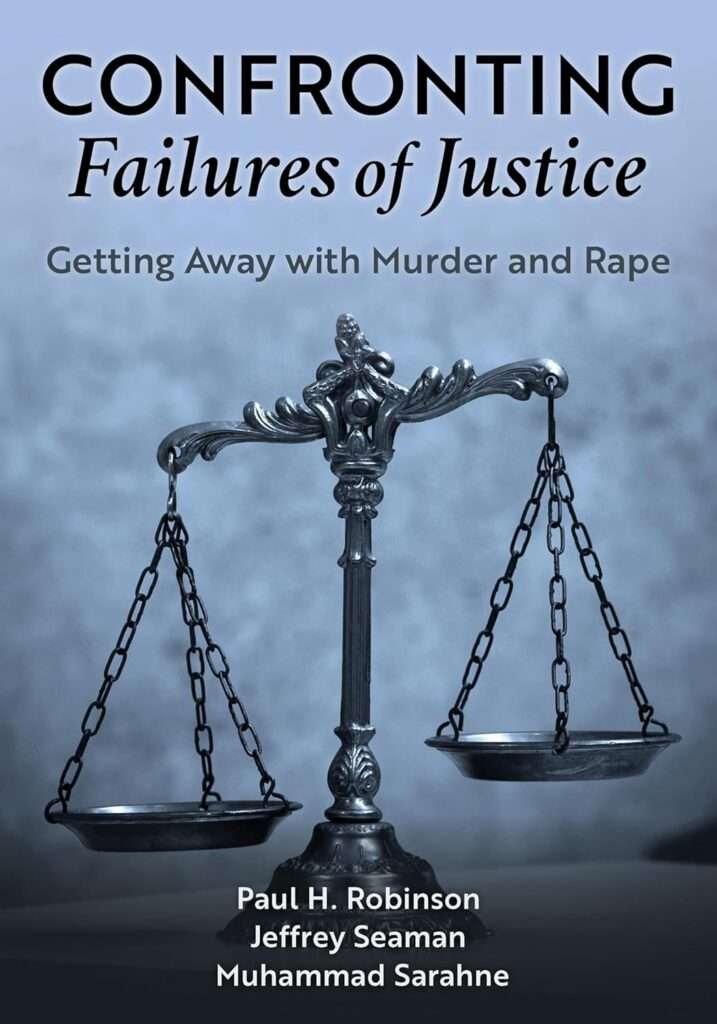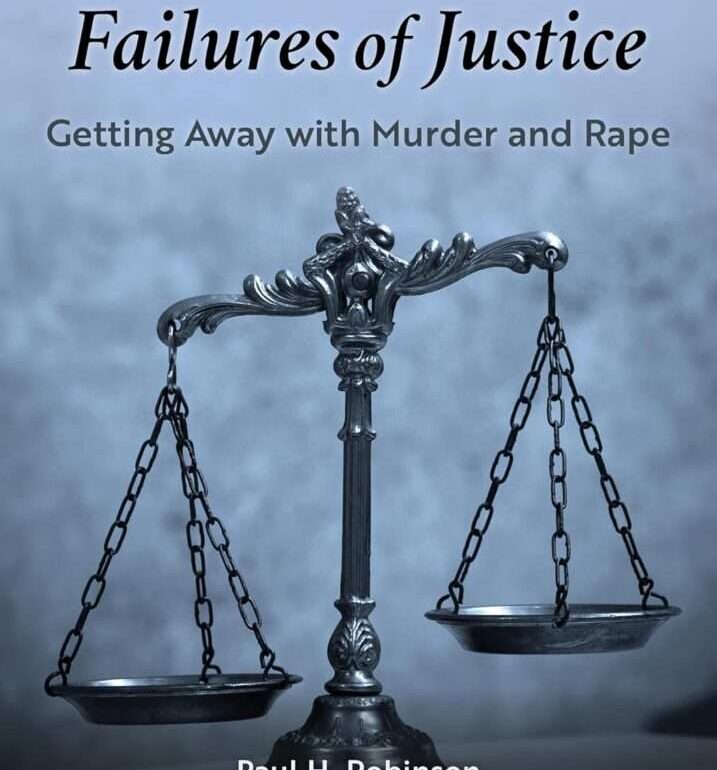
This is the fourth in a five-part series where we’re guest blogging about our new book Confronting Failures of Justice: Getting Away With Murder and Rape, available here. In the previous posts we examined the frequency of failures of justice and their costs. Good public policy (including legal rules) needs to balance competing societal interests, and this is particularly true in the realm of criminal justice where lives are on the line. But as we argue in our book, many aspects of the legal system reflect an archaic or miscalculated balance of interests that needlessly frustrates justice.
For example, do statutes of limitation for rape make sense in a world with DNA evidence and untested rape kits? Should a serial killer really escape justice because a court suppressed all the evidence after concluding a traffic stop went on too long? Should courts even be the ones making such a rule?
One reason why many criminal justice rules are poorly balanced from the perspective of doing justice is that there was no attempt to make a nuanced calculation of societal costs and benefits—merely an effort by judges to create or apply a rigid rule. Indeed, a theme that emerges from studying the causes of failures of justice in the legal system is that judge-made criminal justice policy is rarely well-made criminal justice policy. Here are some excerpts from the book considering the question of balancing societal interests and who should do that balancing.
There are almost always some legitimate interests that can be identified in support of justice-frustrating rules or practices. Thus, rational policymaking cannot simply demand exclusive focus on doing justice but rather must balance competing societal interests. That said, the analyses in previous chapters suggest that the balance of societal interests in current rules and practices is commonly skewed and much in need of rational and thoughtful rebalancing. Even the interpretation of constitutional rules represents a balancing of interests—by judges—that is sometimes explicit and sometimes implicit. A proper balancing of interests is likely to produce more compromise policies than the partisans of a particular issue might like. On the issue of privacy, for example, a proper balancing of interests reflecting society’s preferences would likely satisfy neither extreme privacy advocates nor extreme justice proponents.
The importance of interest-balancing is often ignored by those who might be called “rights absolutists” who believe that any attempt at accommodating a competing interest fatally undermines the other interests at stake. For example, a privacy rights absolutist would see no room for creating less justice-frustrating search rules as it would start policymakers and judges down a slippery slope to a totalitarian world with no privacy rights. Such absolutist thinking creates false dichotomies in policymaking where policymakers and the public are confronted with an either-or fallacy and asked to choose between two extreme versions of the world. Such absolutism can occur on all sides, of course. In constructing our proposed reforms, we have tried to adhere to a nuanced balancing of interests which can be grounded in overall societal good.
As noted, the rules and practices of the justice system ought to reflect a balance between competing societal interests. This raises the question of who should determine the appropriate balance of interests when making criminal justice rules. This book has showcased the variety of actors who currently decide the balance of interests.
Legislatures are the primary determiner over matters such as funding, statutes of limitation, pretrial procedures, rules of evidence, sentencing guidelines, and early release laws. Courts hold primary determining power over constitutional rules such as double jeopardy, search and seizure restrictions, interrogation rules, and the exclusionary rule, as well exercising sentencing discretion. Prosecutors hold determining power in matters of plea bargains and prosecution policies, while executives hold power in matters of clemency. Some practices, such as which distributive principle of punishment to apply (e.g., desert, deterrence, or incapacitation), are decided by multiple actors such as courts and legislatures who sometimes work against one another.
However, since the rules of the justice system should reflect the balance of interests most in society support, it is commonly the case that legislatures are best placed to make fundamental balancing decisions. In a democratic society, it is elected legislatures that are designed to speak most directly to society’s values. As noted in chapter 6, judges are too removed from the public to be properly responsive to changes in public preferences, and the doctrine of stare decisis means old judicial decisions may continue to dictate a balance of interests no longer supported by society. Claims that courts are better placed to make rules because of their lack of political partisanship also ring increasingly hollow as accusations of judicial partisanship and threats of court packing are made with ever greater regularity. There is also no reason to believe that judges—who are generalists by the necessity of their wide-ranging caseloads—possess more relevant expertise in specific criminal law policymaking than legislative committees and subcommittees. Judges were never meant to be makers of law in America’s constitutional system, and it is unfortunate that the latter half of the 20th century saw courts strip legislatures of their ability to weigh the balance of interests in matters such as search and seizure, interrogation, and the question of excluding improperly obtained evidence.
Those who argue against an interest-balancing approach to criminal law, such as the “rights absolutists,” often prefer judges as decisionmakers because judicial decisions are harder to change than democratically passed laws and because they see judges as commonly enforcing “rights” without regard to societal consequences, an approach they feel comfortable with. However, such an absolutist perspective mischaracterizes the situation by seeing judges as somehow immune to personal or political preferences. Judges engage in lawmaking when they turn a dozen constitutional words into a book-length set of constitutionally mandated—and usually very complex—rules, and this lawmaking is often done through application of judges’ idiosyncrasies in balancing the competing interests.
There is no greater sanctity in the resulting judicially created book of rules than there is in a legislatively created book of rules, except that the judicially enacted rules are less democratic in their balance of interests and harder to change. Many “rights absolutist” legal scholars felt comfortable with less democratic judicial decision-making in the past when they tended to agree with the results of judicial lawmaking, but as the recent shift in the ideology of Supreme Court decision-making shows, such a view was based on convenience—not something inherent in the judiciary. In fact, a critical step toward depoliticizing the judiciary is returning more interest-balancing power to democratically elected legislatures who are more constitutionally suited for settling political questions.
Perhaps a wiser and more democratic system of decision-making responsibility can be seen in the U.K.’s parliament which possesses ultimate power to set criminal law rules and practices. For example, when public sentiment in the U.K. turned in favor of allowing a new and compelling evidence exception to the double jeopardy rule, all that was required was an act of parliament instead of a battle over judicial interpretation or clearing the almost impossible bar of passing a constitutional amendment. A better approach for the U.S. might be for courts to more frequently decline opportunities to become lawmakers and to more regularly signal the legislative branch that a balancing debate needs legislative resolution or even that a particular reform is needed. Even if the legislative branch refuses to act on such judicial advice, any judicial remedy should be limited and open to revision by later legislative enactment. Judges should not simply make new laws if we are to take seriously the constitutional separation of powers.
The next post provides a preview of some reforms we propose in our book to reduce failures of justice without greatly damaging other valuable societal interests.
This post was originally published on this site be sure to check out more of their content.







